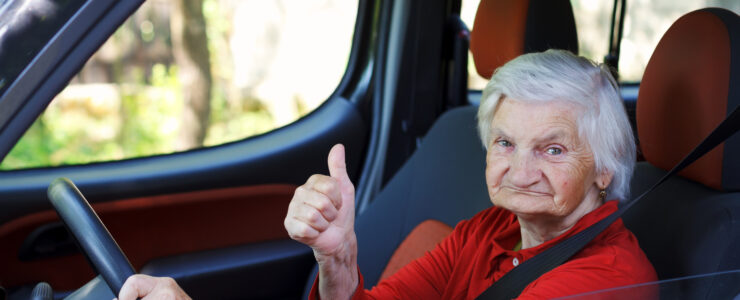
Driving is a crucial aspect of maintaining independence, especially as we age. However, it’s essential to understand that growing older can impact one’s ability to drive safely. As our population ages and healthcare continues to improve, more and more seniors are driving well into their golden years.
To ensure the safety of elderly drivers and other motorists on the road, Nevada has set specific laws that apply to senior drivers. With 22% of fatalities in Nevada involving elderly drivers, it becomes increasingly important to understand the specific laws and regulations that apply to elderly drivers.
Overview of Senior Driving Laws in Nevada
In Nevada, these laws are designed to balance the need for independence with the imperative for safety on the roads. Senior citizens are expected to keep their driving skills up-to-date and maintain their license as long as they can prove that they’re fit to drive.
As seniors age, they may need to pay more attention to the safety of themselves and others by being aware of age-related changes in vision, hearing, reaction times, and cognitive abilities that can affect their driving.
Senior drivers must also abide by the same laws as other drivers in Nevada, such as obeying speed limits and resisting distractions while driving. In addition, there are specific regulations that apply to senior drivers in Nevada, which we’ll go over below.
Understanding the Risks and Data Associated with Older Drivers
Contrary to popular belief, senior citizens are not the primary age group responsible for the highest rate of accidents. According to the Foundation for Traffic Safety (FTS), it’s actually young and inexperienced drivers, particularly males between the ages of 16 and 19, who have the highest crash rate.
However, older drivers do present some increased risks. The Centers for Disease Control and Prevention (CDC) reports that drivers over 70 are more likely to be involved in fatal crashes than drivers with ages 35-54.
Furthermore, older drivers who don’t recognize their limitations pose a significant risk to themselves and others.
Specialized License Renewal Requirements for Senior Citizens
In Nevada, the Department of Motor Vehicles (DMV) has implemented specific rules to ensure older drivers maintain the necessary physical and cognitive abilities for safe driving.
Below are the key elements of Nevada’s license renewal process for senior citizens:
Four-Year Renewals
While regular driver’s licenses in Nevada are typically valid for eight years, drivers aged 65 and over must renew their licenses every four years.
This shorter renewal cycle is implemented to ensure frequent check-ins on the health and ability status of senior drivers. This four-year renewal cycle keeps pace with the rate of physical and cognitive changes that can occur in older adults, thereby providing a safety net for potential issues that may impact driving safety.
During this renewal process, the Nevada DMV incorporates vision tests and may recommend additional evaluations if deemed necessary, including but not limited to a written knowledge test and a road test.
These evaluations aim to detect any potential driving-related issues early and ensure that older drivers possess the necessary skills and abilities required for responsible and safe driving.
Mandatory Vision Tests for Drivers Aged 71 and Over
Drivers aged 71 and over cannot renew their licenses online. Instead, they must renew their license either in person at a DMV office or by mail, and they’re required to take a vision test.
The importance of vision in safe driving cannot be overstated.
In recognition of this, Nevada law requires drivers aged 71 and over to undergo mandatory vision tests when renewing their licenses. The test can be administered at a DMV office, or alternatively, the individual may choose to have an approved eye care professional conduct the exam.
The eye care professional must then complete a Nevada DMV Eye Exam Certificate to verify the results. This mandatory vision testing requirement ensures that older drivers have the necessary visual acuity and peripheral vision to navigate the roads safely.
Additionally, if the vision test results suggest that eyewear is necessary for driving, this will be indicated on the driver’s license. This measure is crucial in preventing accidents and maintaining the safety of all road users.
Potential for Written and Road Test Requirements
The Nevada DMV reserves the right to require a written exam and/or a road test for older drivers during their renewal process. This is typically determined by the senior’s medical conditions or recent driving history.
If a written or road test is mandated, the Nevada DMV will provide the senior with instructions to schedule and take the pertinent tests.
License Restrictions for Senior Drivers
The DMV may impose restrictions or conditions on an older driver’s license based on their medical conditions or driving history. The most common restriction for older drivers is a requirement to wear glasses or corrective contact lenses while driving.
Other potential restrictions for older drivers in Nevada may include:
- Prohibition on freeway driving
- Requirement for vehicle to have automatic transmission
- Additional right-side mirror required on the vehicle
- Vehicle must have a left foot accelerator
- Requirement to drive only with a prosthetic device
- Prohibition against nighttime driving
- Limitation on driving speed to 45 mph or less
- Requirement to wear telescopic lenses while driving
In conclusion, Nevada’s laws pertaining to senior drivers aim to strike a balance between enabling independence and ensuring safety on the roads. The specifics of these laws — the four-year renewal cycle, mandatory vision tests, potential for written and road tests, and possible license restrictions — underscore the state’s commitment to proactive measures that keep our roads safe for all users.
It’s crucial that older drivers understand and adhere to these regulations to protect themselves and others on the road.
Reporting Unsafe Driving
In line with this commitment to safety, Nevada also provides citizens with a way to report unsafe driving.
Family members, law enforcement officers, and representatives from state agencies and other organizations can report a potentially unsafe driver to the DMV.
DMV representatives can also initiate inquiries.
Family members can complete a Request for Re-Evaluation, providing details about the driver and their concerns. This request must be accompanied by a doctor’s affidavit agreeing that the driver should be re-evaluated.
Law enforcement officers or state agency representatives who have observed a driver and have concerns about their safety can complete a Request for Re-Examination. DMV representatives who have reason to believe a driver may be unsafe due to a physical or mental condition can require examinations and reports by a licensed medical professional.
License Reinstatement Process
Depending on the case, the Nevada DMV may suspend or revoke a senior driver’s license for safety reasons.
In such cases, individuals must follow specific steps to reinstate their licenses. These include submitting special forms and providing medical clearance from a licensed physician. It is essential that older drivers go through the proper channels to ensure a safe return to driving if they are ever suspended or revoked.
Consequences of Driving Without a License
Driving without a license or with a suspended license is illegal in Nevada, regardless of age. Both driving on a suspended license (NRS 483.560) and driving without a license (NRS 483.230) are considered misdemeanors and may result in jail time and fines.
Nevada takes proactive steps to ensure the safety of all road users, especially senior drivers. Understanding and adhering to these laws is essential for preserving everyone’s safety on the roads.
It’s important for seniors to stay up-to-date with their license renewal requirements and abide by the applicable laws and restrictions. By doing so, seniors can continue to enjoy their independence while staying safe on the road.
Disability Plates and Placards
Seniors with disabilities may be eligible for disability plates or placards. These allow individuals to park in designated spaces closer to their destination, as well as receive other entitlements for people with disabilities.
To apply for a disability plate or placard, seniors must submit the Disabled Persons License Plates and/or Placards Application along with proof of eligibility, which needs to be certified by a doctor or other medical provider.
First-time applicants must apply in person at a local DMV office, bringing their vehicle registration and current Nevada evidence of insurance.
Alternative Transportation Options
If an older driver has been restricted from driving or is unable to comply with the DMV’s license renewal requirements, they should be encouraged to look into alternative transportation options.
Ride-sharing services such as Lyft and Uber are a convenient and affordable way for seniors to get around town without putting themselves in danger. Additionally, many cities and towns offer public transit systems, such as buses and light rail, which can be a great way for seniors to get around without a car.
For those who need more assistance with their transportation needs, many cities offer specialized services specifically designed for seniors. These could include door-to-door shuttle or taxi services that provide convenient and safe transportation options for older adults.
Legal Assistance for Seniors in Nevada
If you need legal assistance regarding auto accidents or traffic tickets in Nevada, consult a lawyer experienced in representing older people. At Ticket Busters, we’re committed to providing professional, empathetic, and reliable services to help relieve your stress and effectively handle your legal issues.
Contact us today for a free consultation and let us help you get back on the road.
We understand that navigating the legal process can be challenging, especially for seniors. Our experienced team is here to support you every step of the way with professional advice and guidance on Nevada’s laws pertaining to senior driving.

Frequently Asked Questions
What to do if you’re involved in an accident?
If you are involved in an accident, remain at the scene and call 911 immediately. Even if you think there is minimal damage, it’s important to stay and exchange insurance information with the other drivers. Take pictures of any property damage and be sure to file a police report. Be honest about what happened but avoid admitting fault or making statements that can be used against you in court.
If you are injured, seek medical attention immediately and document the extent of your injuries and any treatments received. You may be entitled to compensation for medical expenses, lost wages, or other damages caused by the accident; consult with a lawyer experienced in auto accidents to learn more about your rights.
What to do if you receive a traffic ticket?
If you receive a traffic ticket, consult with an experienced lawyer right away. Depending on the circumstances and the severity of the violation, it may be possible to reduce or dismiss your charges completely. A knowledgeable attorney will review the case and help you determine which options are available for defending against your citation.
How to report unsafe drivers?
To report an unsafe driver in Nevada, contact your local Nevada DMV office. You should include as much information about the driver, vehicle, and any violations witnessed as possible. The DMV will assess the complaint and take appropriate action if necessary.
What types of license restrictions can be imposed on older drivers?
Depending on the driver’s physical or mental condition, the DMV may impose certain restrictions to ensure their safety. These could include limiting night time driving, requiring special headlights or mirrors, a limit to how many passengers can be in the vehicle, and/or a restriction that only allows travel within specific areas. The DMV will work with each driver individually to determine the best course of action.
What alternative transportation options are available for seniors who cannot drive due to certain medical conditions and/or cannot renew their license?
There are a variety of alternative transportation options available for seniors who cannot drive due to certain medical conditions or license restrictions. These could include ridesharing services such as Uber and Lyft, public transport systems like buses and light rail, and specialized senior transportation services that offer door-to-door shuttle or taxi services. Additionally, many cities have programs that provide free or discounted transportation to seniors.


